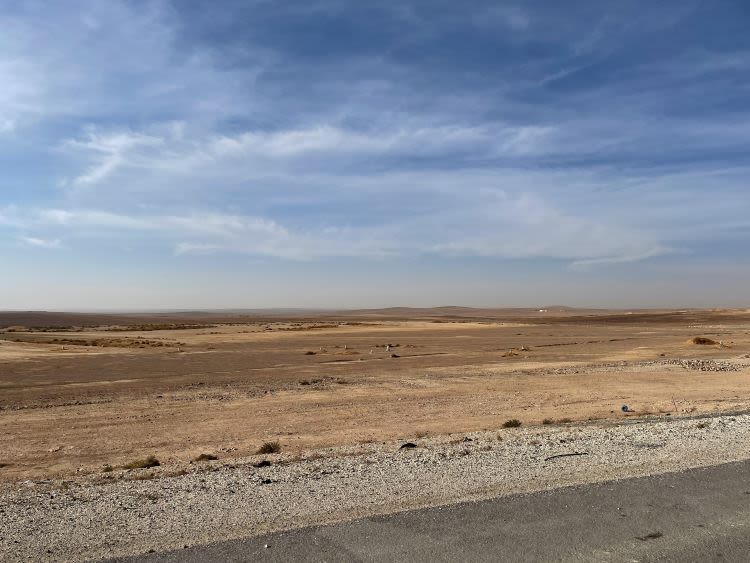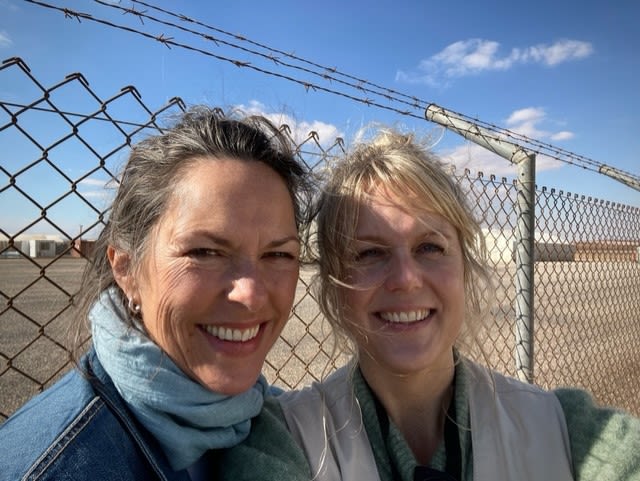Songs from a winter land

As a gas stove warms the bodies of the Syrian refugee family, songs about longing, dreams and hope warm their hearts. Every cold winter morning, Karim, the father of the family, puts on the radio to hear one of the great artists of the Arab world: Fairuz.
The little songbird, Abu Hamed, chirps along enthusiastically.

Fairuz is one of the best known and most popular artists in the Arab world. Photo: NTB/AP Photo/Hussein Malla, File
For decades, nearly all radio stations in the Arab world have started their morning broadcast with a song by Fairuz.
Born in Lebanon in 1935, Fairuz has a repertoire ranging from classical Arabic poets to modern lyricists, battle songs from Palestine and folk songs from the civil war in Lebanon. In recent years, she has been living in Paris.

Fairuz is one of the best known and most popular artists in the Arab world. Photo: NTB/AP Photo/Hussein Malla, File
Fairuz is one of the best known and most popular artists in the Arab world. Photo: NTB/AP Photo/Hussein Malla, File
In a small prefab housing unit in Zaatari refugee camp, Jordan, a family of five is sitting on the sofa talking about the wonderful Fairuz.
They are Karim, 41, Maisa, 33, their two sons Samer, 12, and Khaled, 9, and their young daughter Mal Al Sham, aged six.
Karim is a graphic designer and computer engineer, with a degree from the University of Damascus. Before the war, he worked in Saudi Arabia, and his family lived with him there. In 2011, they were on holiday in Syria. They were forced to flee and have lived in Zaatari since 24 February 2013.
Bird in a cage
A small birdcage hangs from the ceiling. It has been home to a songbird named Abu Hamed ever since Karim bought him at the market in Zaatari four years ago. Abu Hamed also loves Fairuz.
“I simply can’t explain why Fairuz is so fantastic,” says Karim.
He looks questioningly at his wife, Maisa, who answers with the greatest certainty:
“Because Fairuz sings about everyday things, and she does it so beautifully.”
“O’ Bird”
It varies, of course, but the winter months in Jordan are around 15C during the day. At night the temperature creeps down towards zero.

Zaatari refugee camp consists of sand, barracks and fences. Photo: Beate Simarud/NRC
People living in the northern hemisphere are naturally used to much lower temperatures than this, but they should know that the desert winter is characterised by icy winds and hammering rain. And a raw cold that somehow creeps into your body and bites into your bones.

Abu Hamed, the family's pet bird. Photo: Karim
One famous song by Fairuz is entitled “Ya Tair” (O’ Bird). Here are a few lines:
O’ bird, flying to the end of the world, if you could only tell my loved ones about me.
O’ bird, flying away with the colours of the trees, there is nothing left but waiting and emptiness.
Hear Fairuz sing the whole song

Zaatari refugee camp consists of sand, barracks and fences. Photo: Beate Simarud/NRC
Zaatari refugee camp consists of sand, barracks and fences. Photo: Beate Simarud/NRC

Abu Hamed, the family's pet bird. Photo: Karim
Abu Hamed, the family's pet bird. Photo: Karim
Cash against the cold
Jordan has received just over 672,000 Syrian refugees, according to the UN refugee agency. Not all Syrians who have fled to Jordan have been registered, so it’s hard to be certain of the precise number. But whatever the figure, compared to other countries, there is a very high proportion of refugees in Jordan in relation to its overall population of just 10 million.
Some 128,000 of the Syrian refugees in Jordan live in camps, such as Zaatari, while the other 80 per cent live outside the camps.
The refugees here are dependent on help from the authorities and humanitarian aid organisations. In the camp, money is distributed so that people can buy what they need.
In Zaatari, there is a long high street full of small, busy shops.
Here are bakeries, vegetable shops, shops selling children’s clothes, kiosks with fizzy drinks and sweets, butchers, bicycle workshops and bridal shops. The street is named after the famous Champs-Élysées in Paris.
A thousand people a day
NRC has the task of administering the distribution of aid to the refugees in Zaatari. Our staff consist of locally employed Jordanians and refugee volunteers.

NRC’s employees and refugee volunteers distribute cash so that the camp residents can buy what they need to survive the winter. Photo: Beate Simarud/NRC
The camp has two distribution centres: one for food, another for distributing cash, bars of soap, hygiene items, face masks and baby diapers. This distribution takes place every three months, over a two-week period. Around a thousand people come to the centre every day to receive help.
The sound of people waiting for help:
Now that winter is here, people need money to buy gas to heat their shelters and cook their food. And they need winter clothes, especially the children.

In addition to cash, Karim also picks up packs of soap and hygiene items at NRC’s distribution centre. Photo: Beate Simarud/NRC
In addition, people need to buy silicone and other insulation material to seal any cracks and holes in their shelters. These prefab housing units were not designed to be used for so many years – who would have thought that the war would last so long?

NRC’s employees and refugee volunteers distribute cash so that the camp residents can buy what they need to survive the winter. Photo: Beate Simarud/NRC
NRC’s employees and refugee volunteers distribute cash so that the camp residents can buy what they need to survive the winter. Photo: Beate Simarud/NRC

In addition to cash, Karim also picks up packs of soap and hygiene items at NRC’s distribution centre. Photo: Beate Simarud/NRC
In addition to cash, Karim also picks up packs of soap and hygiene items at NRC’s distribution centre. Photo: Beate Simarud/NRC
Dreaming of jackets
Karin, Maisa and their children plan to go to the market in Zaatari together to buy new winter jackets for the children. The family is clearly excited about the outing, and you can tell it is going to be a big day. The children have long talked about what the new jackets should look like.
“Mine is going to be black and have fur around the hood,” says Samer.
“Mine is going to be navy blue with fur on the inside,” says Khaled, who has just been in the next room to change his jumper – perhaps in honour of the photographer?
“Mine is going to be pink,” chirps Mal Al Sham from her father’s lap.
She is cuddling her cloth doll named “Sham”, which is also the name the Syrians use for their capital city, Damascus. Mal Al Sham received the doll as a gift from her father when she managed to get perfect marks on an English spelling test.
Her mother, Maisa, who dreams of becoming an Arabic teacher, has crocheted a dress for Sham. She tells us:
“I went to a tailoring course run by NRC, where I also learned to crochet. I make wool clothes for the children to wear when it is cold.
“They are always growing and go up a size each winter. I can’t afford to buy new yarn every year. Instead, I add on to the old garment to make it bigger. I learn new stitches on YouTube, but I make all the patterns myself.”
O’ bird, flying to the end of the world, if you could only tell my loved ones about me.
I swear by your feathers and the rest of my days,
I swear by the thistle flower and the blowing wind,
If you were to fly to them, my love would be unbearable.

The pet bird Abu Hamed lives in a cage, but his singing is reminiscent of a world other than Zaatari. Photo: Karim
The “new” children
Zaatari refugee camp, which opened on 29 July 2012 to house Syrians fleeing the ongoing civil war in their homeland, has become a symbol of Syrian displacement throughout the Middle East.
Zaatari is located in the desert, a couple of hours drive from the Jordanian capital Amman. From the camp, it only takes 45 minutes to drive to the Syrian border.

The options are not great for the Syrian refugees. Photo: Beate Simarud/NRC
Zaatari was built as a temporary refugee camp. At first it consisted only of a cluster of tents, but it has since developed into a large, urban settlement.
The years have passed.
And a new generation of Syrians has been born in the camp. Like Khaled and Mal Al Sham.

There are children living in Zaatari who have never known anything else. Photo: Beate Simarud/NRC
These are children who have never known anything but Zaatari.

The pet bird Abu Hamed lives in a cage, but his singing is reminiscent of a world other than Zaatari. Photo: Karim
The pet bird Abu Hamed lives in a cage, but his singing is reminiscent of a world other than Zaatari. Photo: Karim

The options are not great for the Syrian refugees. Photo: Beate Simarud/NRC
The options are not great for the Syrian refugees. Photo: Beate Simarud/NRC

There are children living in Zaatari who have never known anything else. Photo: Beate Simarud/NRC
There are children living in Zaatari who have never known anything else. Photo: Beate Simarud/NRC
Help over the years
Karim says:
“When we first fled, we were registered by the UN High Commissioner for Refugees (UNHCR) and sent here to Zaatari. I remember we got the help we needed: it was a tent, kitchen utensils, mattresses, blankets, dry food – like bulgur and peas – as well as tinned food.”
He smiles a little, before continuing:
“But at that time we were really most thankful that we had managed to get to safety. The road from Syria to Jordan was dangerous. There were planes, gunfire, chaos and frighteningly loud noises. Here in Zaatari, we felt safe.
In the beginning, we received dry food every 14 days. Later, they handed out vouchers that we could use at the market. Today, everything is done through the distribution of money. It gives us more freedom.”
How are the winters here?
“The cold gets into your bones, and it is hard to get it out of your body again. The housing unit we live in is in poor condition. It can’t handle summer heat or the winter rain. The streets become muddy when it rains, and everything gets dirty. It’s going to be cold. But we have a gas stove and we have warm clothes.”
Today you have picked up your winter assistance at the distribution centre. What will you buy, in addition to warm jackets for the children?
“I received 250 Jordanian dinar [about USD 353]. I will use some of that money to buy gas. And plastic and silicone foam for our housing unit, which must be repaired throughout the year.”
Abu Hamed chirps loudly from his cage.
Maisa serves Arabic coffee.
Karim strokes Khaled’s hair and says with a small smile:
“And then we will buy new winter shoes for the children.”
O’ bird,
take me with you,
if only for a little while,
please take me back.
O’ bird, flying to the end of the world, if you could only tell my loved ones about me.
O’ bird, flying away with the colours of the trees, there is nothing left but waiting and emptiness.
O’ bird.

Photo: Beate Simarud/NRC
Photo: Beate Simarud/NRC

Kristine Grønhaug (text) and Beate Simarud (photo)

